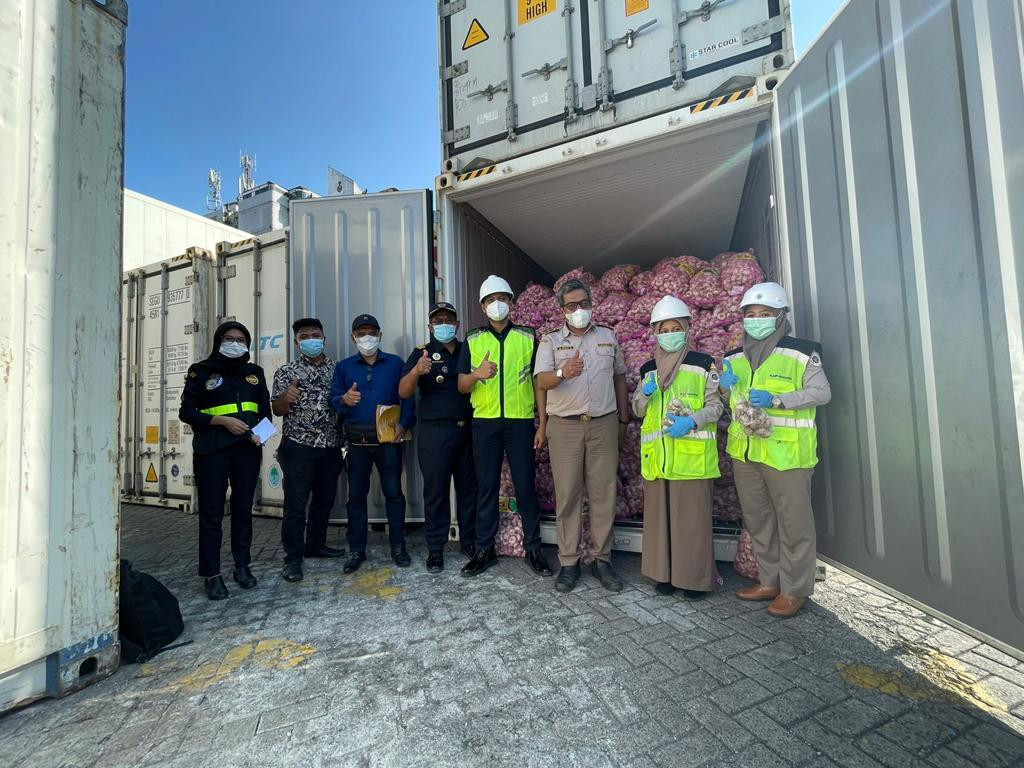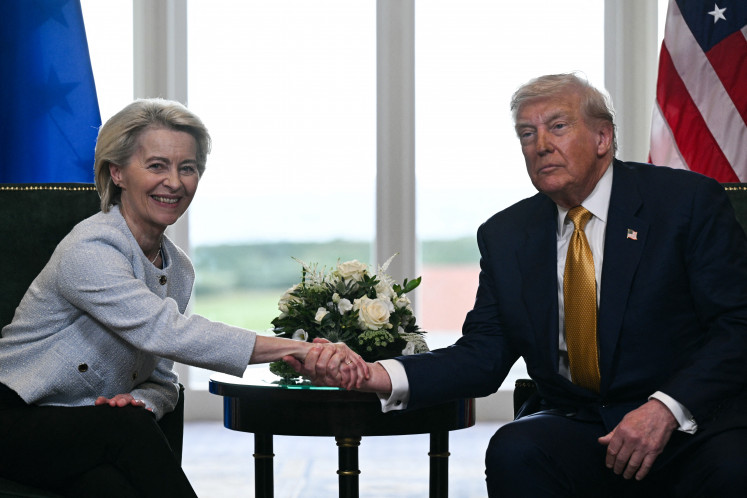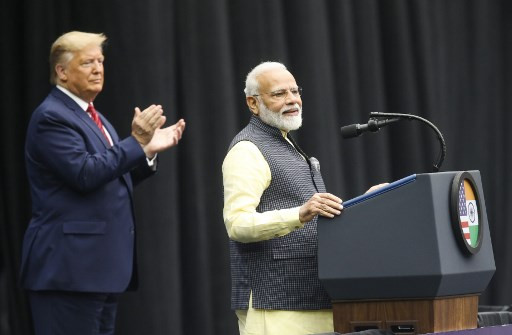Popular Reads
Top Results
Can't find what you're looking for?
View all search resultsPopular Reads
Top Results
Can't find what you're looking for?
View all search resultsNational Logistics Ecosystem optimizes 2024 state budget
Indonesia’s national economic growth has continued its positive trend despite a global economic slowdown, growing above 5 percent for seven consecutive quarters.
Change text size
Gift Premium Articles
to Anyone
I
ndonesia’s national economic growth has continued its positive trend despite a global economic slowdown, growing above 5 percent for seven consecutive quarters. Bank Indonesia (BI) estimates that in Q3 2023, national economic growth will be in the range of 4.7 to 5.5 percent, highlighting the archipelago’s resiliency.
At the same time, the national economy is inseparable from the performance of national trade. Statistics Indonesia (BPS) has recorded that the national Trade Balance (NP) has been in surplus for the last 41 months. The positive NP contributed to the controlled deficit of the current account, which BI recorded as low amid falling commodity prices and an increase in domestic demand.
BI’s Q2 2023 report stated that the performance of capital and financial transactions remained under control, which is supported by foreign direct investment (FDI) amid an uncertain global financial market. A solid direct investment indicates maintained positive investor perceptions of the domestic economic outlook.
Head of the Indonesia National Single Window Agency (LNSW), Agus Rofiudin, underlined the importance of trade between countries and FDI, as the two serve as an instrument for economic growth.
“Trade allows a country to consume goods and services more cheaply than other countries based on its comparative advantage. Meanwhile, FDI encourages the transfer of technology, human capital and institutional improvements from developed countries to developing countries," he explained.
A healthy trade and FDI climate allows the potential for lower logistics costs, shorter transportation times and additional job opportunities as a result of growth in the private sector.
"Delivery time efficiency encourages business productivity, which has a positive effect on national competitiveness. As a result, the combination of productivity and competitiveness encourages economic growth," Agus added.
Encouraging smooth logistics
During the ratification of the 2024 state budget (APBN) draft in September, it was agreed that the 2024 APBN must, among other things, serve as a policy instrument that could be relied upon to face economic turmoil in 2024.
Agus noted that geopolitical tensions could cause fragmentation and narrowing of international relations, especially in terms of trade. He cited the World Trade Organization (WTO), which predicts in its Global Trade Outlook report that the global trade volume in 2023 will only grow by 1.7 percent and only pick up in 2024 by 3.2 percent.
The Indonesian government has prepared the 2024 APBN with macro assumptions such as economic growth of 5.2 percent, inflation of 2.8 percent and an exchange rate of Rp 15,000 per US dollar.
The 2024 state expenditure of Rp 3,325.1 trillion has been mainly allocated for central government expenditure with Rp 2,467.5 trillion, while transfers to regions amounted to Rp 857.6 trillion. The focus on central government expenditure is meant to strengthen the state budget as a function of allocation, distribution and stabilization.
In addition, the 2024 state budget was designed to face major challenges, including a geopolitical situation with no clear end in sight, the effects of climate change, continuing pandemic concerns and a rising digitalization trend.
Currently, the national economic performance is driven by leading sectors such as industry, trade, agriculture, mining and construction. The industrial field has been recorded as the largest contributor compared to other business sectors.
"In this condition, the composition of national imports is still dominated by supporting raw materials. As a result, the logistics process in the form of a smooth supply of raw materials and production results must be maximized," added Agus.
However, the national logistics performance has not been ideal. The World Bank (WB) in the 2023 Logistics Performance Index (LPI) placed Indonesia's logistics performance at rank 63 with a score of 3.0. At the same time, national logistics costs are still relatively high at 14.29 percent of the gross domestic product (GDP).
Infrastructure spending in the 2024 state budget is at Rp 422.7 trillion, which will be directed to accelerate the development of economic driving infrastructure such as connectivity and transportation, energy and electricity and food; provide basic service infrastructure and strategic projects; as well as equalize and strengthen access to ICT that supports digital transformation.
Connectivity, transportation as well as ICT infrastructure are closely linked to logistics performance. The construction of roads, bridges, airports and harbors is strengthened by providing internet access points to the Digital Broadcasting System (DBS). At the same time, infrastructure development can be maximized by the implementation of the National Logistics Ecosystem (NLE).
Maximizing the state budget
As stated in Presidential Instruction No. 5/2020, the NLE is one of the government's strategies to face logistics performance challenges. According to Agus, the NLE is a digital platform for upstream to downstream logistics services in collaboration with ministries and institutions along with related companies.
The system simplifies government service business processes in the logistics sector, collaborates with private logistics service systems both domestic and international, facilitates state revenue payment transactions and payments between logistics business actors, and organizes port layouts and goods distribution routes.
This condition is made possible with the four basic pillars of NLE: simplification of government and private service business processes; logistics platform collaboration; ease of payment with a single billing scheme; and spatial planning by implementing policies that encourage efficiency in the movement of goods.
"Digital collaboration on one platform [NLE] will ensure the smooth flow of export and import goods as well as domestic goods, both between regions within one island and between islands," he said.
The LNSW implements the NLE in the form of the One Stop Online Service System service, the Single Submission (SSm). Services such as SSm Transporter, SSm Licensing and Single Submission Quarantine Customs have succeeded in reducing business process stages, reducing repetition and replication processes with a single submission, and making it easier to manage government logistics services.
Approximately 15 ministries and institutions have made the process easier for business actors by no longer requiring them to go to individual ministries and institutions regarding regulations, processes and requirements for ease of doing business.
In addition, the Finance Minister emphasized to The NLE Team is a collaboration between the Directorate General of Customs and Excise (DJBC) and the Indonesia National Single Window Agency (LNSW) the importance of continuing managing the NLE while maintaining existing facilities for industry and trade.
"The aim of developing the NLE is to make the process of doing business in Indonesia more competitive, in terms of time, simplification, speed and, ultimately, in terms of cost," Agus concluded.
Source: The Finance Ministry










